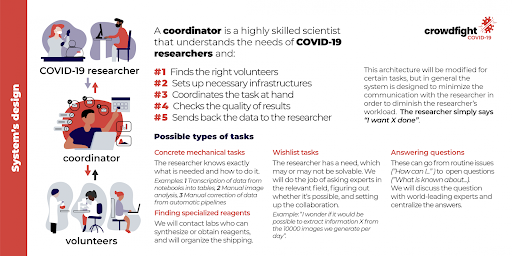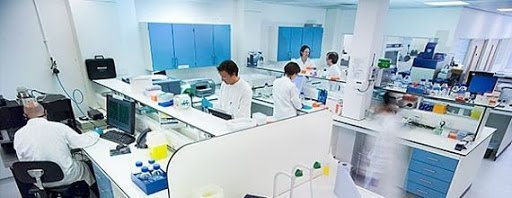COVID-19: What Can Life Scientists Do To Help?
As life scientists around the world find their labs closed and scientific research on hold, a lot of us in the community are asking what we can do to help.
We’ve put together this round up of initiatives we’ve spotted calling on life scientists to put their skills and equipment to use in the global effort against the COVID-19 pandemic.
Our list is focused mainly on the UK and US as that’s where our offices are, but if you’re based in another country and have seen more initiatives we can add to this list, please share them in the comments and we’ll help promote them on our social media channels.
Volunteer with Crowdfight COVID-19
Website: https://crowdfightcovid19.org/
Right now, there’s a huge pool of highly skilled scientists (like you) who want to volunteer their time and expertise. Crowdfight COVID-19 is an initiative launched by the scientific community to co-ordinate and put all the available resources at the service of the fight against COVID-19.
You can offer support with anything that can be done outside your lab. Simply submit the volunteer form and let them know what you can offer.
Examples of typical simple tasks which will really help are:
- Transcribing data from notebooks into tables
- Manual analysis of images (segmentation, tracking, identification of cells, etc.)
- Data curation and annotation
Here’s a helpful infographic explaining how the service works:

Image: crowdfightcovid19.org/
Add your lab to the Covid-19 Volunteer Testing Network (UK only)
Website: https://www.covid19-testing.org/
The Covid-19 Volunteer Testing Network’s mission is to make it possible for all frontline healthcare staff to be tested for Covid-19. They’re supplementing UK government efforts by using smaller labs to conduct testing, supporting them to set up logistics and processes so they can provide same day results back to frontline NHS and Healthcare staff.
They’re looking for labs who have existing RT-PCR machines and a Level 2 (or higher) Laminar Flow cabinet and qualified personnel who are willing to volunteer to conduct the tests.
Find out more: https://www.covid19-testing.org/labs.html
Alongside recruiting labs to conduct testing, they’re also creating three associated UK-wide frameworks to register and administer support in the form of:
- A network of non-testing labs which can help with materials and small items of equipment in short supply
- A network of experienced scientists, technicians and lab managers who are willing to join other lab's teams or are relevant experts who would be able to give support to the labs from home
- A register of 'dormant' RT-PCR machines and their potential availability

Image: covid19-testing.org
Add yourself to the COVID-19 Pandemic Shareable Scientist Response Database (US only)
Website: COVID-19 Pandemic Shareable Scientist Response Database
This database has been created to list US scientists from all 50 states, DC, Puerto Rico, and Guam who are willing and able to volunteer their time, expertise, equipment, and consumables to aid the national response to the COVID-19 crisis.
Contact information, locations, and skills sets have been aggregated into an easy-to-use centralized database. Members include experts in scientific testing, bioinformatics, and data management, as well as key contacts willing to donate lab space and testing supplies.
Volunteer for the Ask-A-Scientist Chatbot (US only)
Website: COVID-19 Ask a Scientist Site
The Federation of American Scientists, the New Jersey Office of Innovation and the Governance Lab have developed the COVID-19 Ask-A-Scientist ChatBot service, which is powered by volunteers. If you would like to volunteer, they’re asking scientists with relevant expertise to email covid19@fas.org
Find out more on their About page.
Donate PPE & Other Supplies (US & UK)
Get Us PPE (US): https://getusppe.org/
If you’re based in the US and you have PPE equipment you can donate to frontline healthcare workers (including surgical masks, protective goggles, gloves, face shields, wipes or disinfectant, coveralls or booties), here’s how you can do that: https://getusppe.org/give/
The National Equipment Appeal Database (UK): https://www.thenead.co.uk/
The National Equipment Appeal Database has been designed to coordinate the collection of civilian-held personal protective equipment and distribute these items to the hospitals, GP surgeries, care homes, the emergency services, and other beneficiaries who need them most. If you have PPE to donate, fill out this form.
Collaborate with University of Cambridge (UK)
The University of Cambridge is coordinating activities to address COVID-19 by establishing research collaborations with other research institutions and partners in key disciplines including: clinical trials, critical care, diagnostics, immunology, infectious diseases, public health, respiratory medicine, vaccines, virology, business risk, data science and modelling, engineering and manufacturing.
If your organisation works in one of these areas and is interested in collaborating with the University of Cambridge, they’re asking you to get in touch by filling out this form.
Support to educate people on social media (global)
If you’re active on social media, you can help spread accurate and factual information to your networks by breaking down complex scientific jargon, debunking false information, and sharing the science behind why simple measures, such as washing your hands and keeping two metres apart, are key in the fight against the pandemic and for keeping each other safe.
_________________________________________
_________________________________________________
For scientists who can't can't get into the lab at this time, why not check out the other resources available on our blog. We are passionate about supporting life scientists, early career life scientists and PhD students - with really low- priced reagents and biochemicals, travel grants, and resources to help with both personal and professional development. We know how tough it is - so we hope you find these helpful!
Advice & guidance for life scientists
Click below to view our essential guides and articles to support life scientists, PhD students & early career life scientists:
Wellbeing for scientists
Click below for our resources to help improve your wellbeing:
Technical resources
Try our Molarity Calculator: a quick and easy way to calculate the mass, volume or concentration required for making a solution.
Try our Dilution Calculator: an easy way to work out how to dilute stock solutions of known concentrations
And - when you get to the stage of planning your experiments, don't forget that we offer a range of agonists, antagonists, inhibitors, activators, antibodies and fluorescent tools at up to half the price of other suppliers - click below to see how we compare with other suppliers:


















